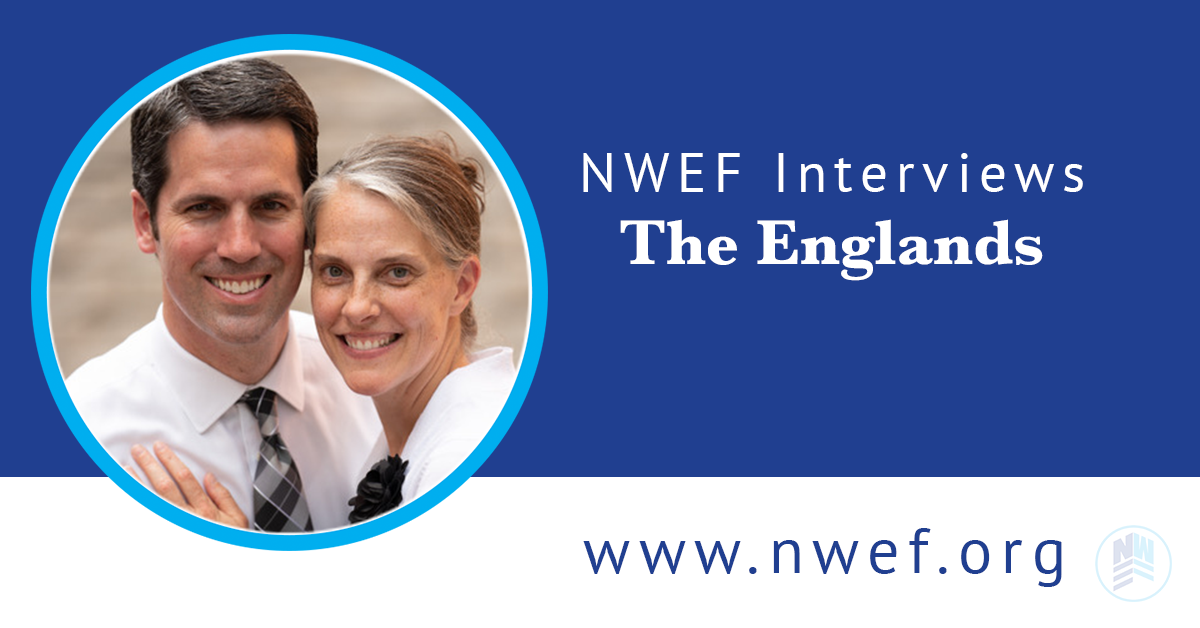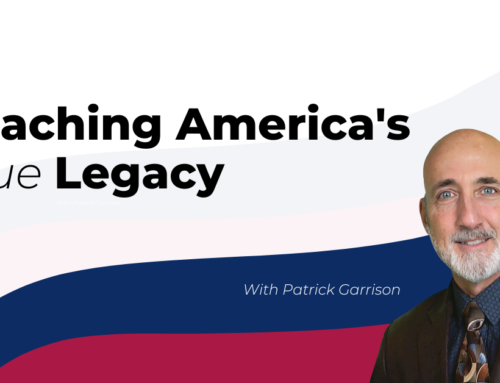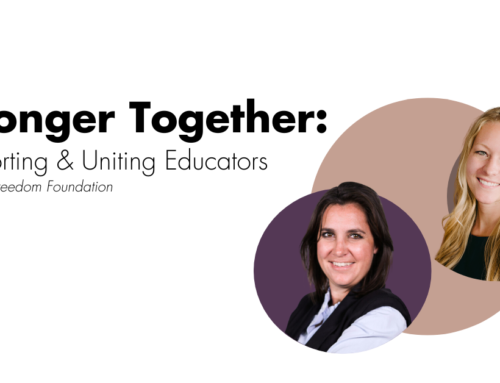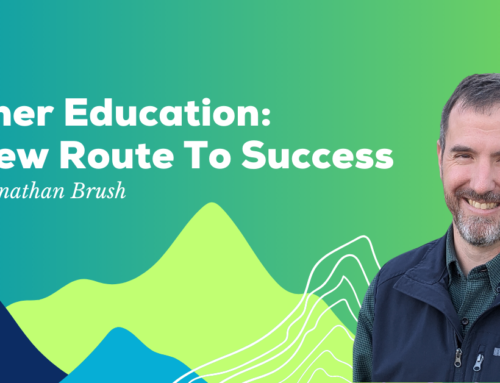
Today, NWEF is pleased to interview Robbie and Rachel England. The Englands are an accomplished husband-wife team living in rural Pennsylvania, with passions that focus on faith and family.
In 1996, Rachel graduated from the College of William and Mary with her Masters in Special Education. After college, she taught in a private school for two years and taught in the public school setting for over five years. She went on to raise a family and start a home music studio.
Robbie graduated from Trevecca Nazarene University with a B.A. in Physician Assistant Studies in 1998. Over the last 22 years, he has practiced medicine at a rural family business. Since 2000, Robbie has been on the God’s Bible School and College Board of Trustees and has served as Chairman of the Board for the last five years.
Robbie and Rachel have both served on their local school board and been active in faith ministries in their home and community. Their family also runs a local Airbnb.
Over the years, they have been highly involved in the lives of their four children. Their experiences have taught them about the importance of the parent-child relationship, especially parental involvement in a child’s spiritual and educational journey. Robbie and Rachel believe that “every one of us, as parents, needs to take the responsibility seriously—that it’s our responsibility under God—to train our children….”
Parental Involvement
Rachel and Robbie encourage parents to build relationships with their children and nurture a healthy home environment, because that is where education begins. Teaching character must begin in the home. If parents neglect that role, Robbie says, “There will be a vacuum, and someone else will be shaping those values…that our children are embracing and then shaping their lives, then shaping their children… it’s just a cascading effect.”
The Englands make it a point to consistently build relationships with their growing children. As Rachel puts it, “You can’t really lead your children until you have that relationship with them.” They like to have weekly dates with their children to help maintain closeness and “keep the grass mowed between their heart[s] and [ours].”
Teaching children to have a moral compass is also done through leading by example. Instructing children on morals, values, and principles is not enough—parents must also embody what they teach in how they interact with the world.
“It’s really easy to say, ‘Respect authority.’ But when someone doesn’t treat you well at church or in the community, how do you respond? That says way more than 14 lectures on respect,” Robbie says. “I think it’s just so important that we live out these values and not just talk about them, but they actually become a part of our lives.”
As devoted Christians, the Englands believe that it is their responsibility to prioritize their children’s moral development. Rachel says that “[spiritual training is a parent’s number one job]. Everything else is secondary. And that goes with not just teaching them how to think, but what we believe and why we believe it. They should know that inside and out and upside down from the moment they’re very, very young.”
Rachel’s Experience on the School Board
Robbie and Rachel have both served on their local school board. Rachel served for 8 years after her first child was enrolled in the local district, fueled by concern at the idea of her child being under the influence of the public system.
She wanted to stay closely involved, but she wasn’t entirely sure how until she heard a Focus on the Family radio program with David and Kelli Pritchard. Rachel quickly ordered their book Going Public. “I…read the book, and a big, huge thing that they said was…you must be involved, and the best way to be involved is [to] be on the school board.”
Rachel had already been serving her local school by volunteering each week in the classroom or wherever else she was needed. This work helped her build valuable relationships and perspectives that would later help her during her school board tenure.
She also realized that there were no educators on the school board and thought to herself, “There really should be somebody on the board who can give that teacher perspective.” She wanted to help board members, teachers, and administrators overcome their differences and work together for the benefit of students.
One of Rachel’s main objectives while serving on the board was to read through all of the curricula. As part of this goal, she facilitated the editing of a science textbook that misled students by teaching the theory of evolution as a fact rather than a theory. Rachel brought this issue to her superintendent’s attention, and a few months later, the textbook was rewritten so that it was not misleading.
Robbie’s Experience on the School Board
Robbie has recently been elected to his local school board. He has over 20 years of experience serving on the God’s Bible School and College Board of Trustees (a private Christian college in Ohio) and looks forward to this opportunity to use his strengths to serve on a public school board.
His reasons for serving are twofold, he says. “One is to say thank you [to the school] for what you’ve done for my family; the other is to say, ‘What can I do to help ensure that we are doing everything we can to provide the best possible education opportunity for the students in the future?’ I just want to make sure that we’re doing everything we can to continue the trend of a healthy education for our students.”
In addition to promoting good education, he also believes that parents must be involved in the education system during such divisive social times as these.
“I hear ‘critical race theory’ and it scares me from the standpoint [of] basically we’re saying that everybody’s a loser. That either you’re a white supremacist or you’ve been somehow mistreated as a person of color … Critical race theory is going to be successful or it’s going to fail at the level of the local school board…”
He believes that it is “incumbent upon us as people of value, of faith, to stand up and to be a part of this process, and so I look at it as an opportunity to not only live out my faith in the public square, but also to hopefully help to stop some of the things I think are going to be very unhealthy for the future of the educational system in our country.”
Leadership and Vision
Clearly, the Englands are an ambitious couple. During the interview, NWEF President Melvin Adams takes the opportunity to ask them about their thoughts on leadership and vision.
What is leadership? When it comes to leadership and vision, which one must come first?
To Robbie, living a life of authenticity is a key component of being a leader. “If you boil it down to one word, leadership, to me, is influence. If you don’t have influence and you think you’re a leader, you’re just out on a walk by yourself…So first of all, I think leadership starts with a personal commitment to living a life of integrity and knowing who you are, then recognizing what you don’t have and getting people around you to help you fill those spots, and then pulling together.”
Rachel discusses how leadership must come before vision when it comes to building a network of influence. “I think leadership comes first, because I think if you don’t have those relationships and you don’t build that foundation of the influence you start with, you can’t have the vision. I know people who start with a vision, but they don’t have those relationships founded very well. It does not work.”
For the Englands, building leadership-worthy relationships as the foundation for their vision is a rewarding process. They find great fulfillment in the lives they have been called to live as parents and servants of their community.
In Summary
Throughout this interview, Robbie and Rachel also discuss how parents can take action in their local schools and communities by preparing for a crisis before it happens. They also discuss the current state of education and the role of instruction, tapping into their perspective that teaching should include practical life skills. They also weigh in on government overreach in education. Rachel also highlights her personal experiences on the local school board, and Robbie compares his experience on a college board vs. a public school board.
In closing, Rachel and Robbie share some encouraging words with parents, teachers, and legislators. Rachel says, “[We need] to be sure that we are reflecting our communities. I think that…there are little core groups that are trying to change our whole society into their mold. I think as we stay involved—as we use our relationships and influence to help others—we need to all work together to make sure that our communities are really reflecting what the majority want, not just the few special interest groups.”
Robbie appeals to those who might be wondering what they can do to help. He encourages citizens to start by “being aware, being informed, and then being involved…I think entering the system and not running away from it, but helping to bring light and truth to that space is so critical.”
To watch the entire interview, click here. To watch specific portions, you can select a video topic below:
-
- Introduction and Defining Education
- Why Rachel Ran for the Local School Board
- Challenges and Accomplishments of a School Board Tenure
- Outside Influences on the School Board
- Robbie’s Goals for His Time on the School Board
- Robbie’s Experiences Serving on the School Board
- Private and Public School Board Experiences
- Leadership and Vision
- Challenges and Opportunities Facing Education Today
- What Should Parents Do?
- The Role of Instruction
- The Importance of the Parent-Child Relationship
- Thoughts on Government Overreach
- Closing
Want to hear more from today’s teachers, parents, administrators, and policy influencers? Subscribe to our YouTube channel to receive alerts when we post new interviews!
Note from the Editor: We thank all our contributors for their insights and expertise. However, the views of guest authors or interviewees are not necessarily those of Noah Webster Educational Foundation.





[…] comes as no surprise that character training begins at home. However, it must continue to be taught and reinforced as a part of formal education. Good moral […]
[…] for office! Serving on the school board provides an excellent opportunity to be directly involved in the policies and decisions that affect your kid’s school experience. The school board oversees the local school system, […]
[…] comes as no surprise that character training begins at home. However, it must continue to be taught and reinforced as a part of formal education. Good moral […]